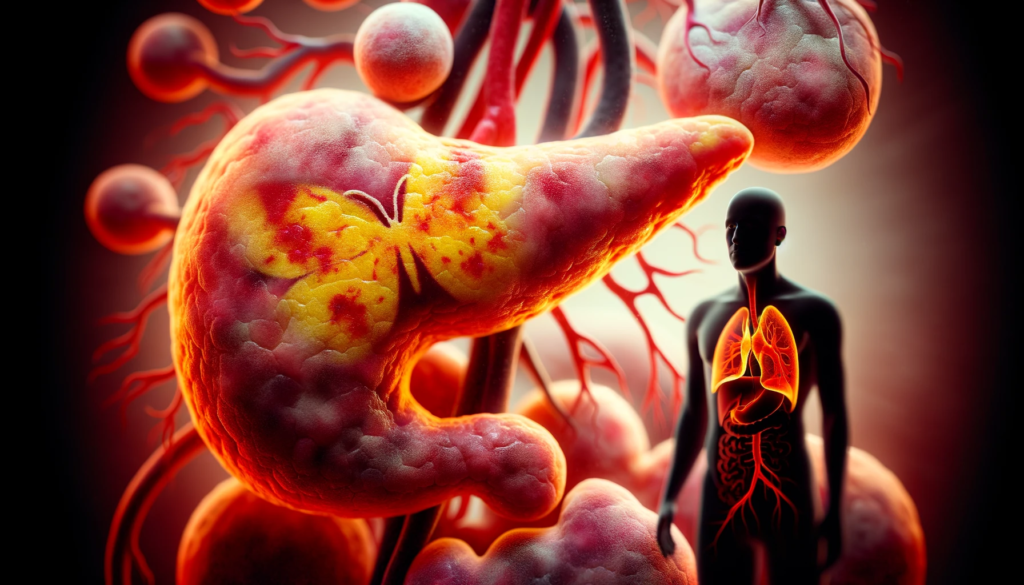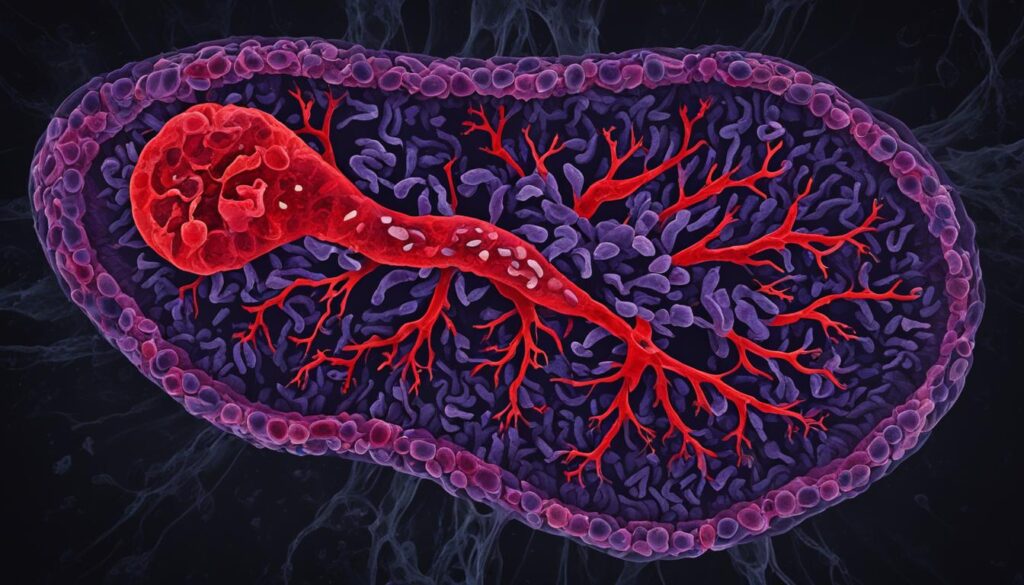Can Lupus Cause Pancreatitis?
 January 18, 2024 | Lupus
January 18, 2024 | Lupus
Pancreatitis, which is inflammation of the pancreas, is a rare complication of systemic lupus erythematosus (SLE). While it is uncommon, there have been reported cases of pancreatitis in patients with SLE.
This condition, known as lupus-associated pancreatitis, can occur as an initial manifestation of SLE or during the course of the disease. It is characterized by abdominal pain, nausea, vomiting, and elevated pancreatic enzyme levels. The exact cause of lupus-associated pancreatitis is not fully understood, but it is believed to be related to the autoimmune nature of SLE and potentially influenced by medications used for treatment.

Key Takeaways:
- Lupus-associated pancreatitis is a rare complication of systemic lupus erythematosus (SLE).
- It can occur as an initial manifestation of SLE or during the course of the disease.
- The condition is characterized by abdominal pain, nausea, vomiting, and elevated pancreatic enzyme levels.
- The exact cause of lupus-associated pancreatitis is not fully understood, but it is believed to be related to the autoimmune nature of SLE.
- Treatment involves managing SLE and addressing the inflammation in the pancreas.
Table of Contents
- Symptoms of Lupus-Associated Pancreatitis
- Diagnosis of Lupus-Associated Pancreatitis
- Treatment Options for Lupus-Associated Pancreatitis
- Prognosis of Lupus-Associated Pancreatitis
- Complications of Lupus-Associated Pancreatitis
- Prevention of Lupus-Associated Pancreatitis
- Management of Lupus-Associated Pancreatitis
- Case Reports and Studies on Lupus-Associated Pancreatitis
- Conclusion
- FAQ
- Source Links
Symptoms of Lupus-Associated Pancreatitis
The most common symptoms of lupus-associated pancreatitis include abdominal pain, which may radiate to the back, and gastrointestinal symptoms such as nausea and vomiting. Laboratory tests can help in the diagnosis of pancreatitis, with elevated levels of pancreatic enzymes, specifically amylaseand lipase, indicating pancreatic inflammation. Imaging tests, such as CT scans and ultrasounds, may also be used to evaluate the pancreas and rule out other causes of abdominal pain.
Common Symptoms of Lupus-Associated Pancreatitis:
- Abdominal pain, often radiating to the back
- Nausea and vomiting
- Elevated pancreatic enzyme levels, such as amylase and lipase
If you suspect lupus pancreatitis or experience these symptoms, it is important to consult with your healthcare provider for an accurate diagnosis and appropriate management. Early detection and treatment can help prevent further complications and improve outcomes.
| Symptoms | Possible Indicators |
|---|---|
| Abdominal pain | Radiating to the back |
| Nausea | Feeling of queasiness |
| Vomiting | Expelling stomach contents forcefully |
| Elevated pancreatic enzyme levels | Abnormal levels of amylase and lipase |
The symptoms of lupus-associated pancreatitis can vary in severity and may overlap with other conditions. Seeking prompt medical attention and undergoing diagnostic tests can help confirm the presence of pancreatitis and guide appropriate treatment strategies.
Diagnosis of Lupus-Associated Pancreatitis
The diagnosis of lupus-associated pancreatitis involves a comprehensive approach that includes evaluating clinical symptoms, measuring pancreatic enzyme levels, and conducting imaging tests. These steps are crucial to differentiate lupus-associated pancreatitis from other causes of pancreatitis and determine the most suitable treatment plan.
Diagnostic Tests
To confirm the presence of lupus-associated pancreatitis, healthcare providers rely on specific diagnostic tests:
- Pancreatic enzyme levels: Laboratory tests measure the levels of pancreatic enzymes, such as amylase and lipase, in the blood. Elevated levels of these enzymes indicate pancreatic inflammation and support the diagnosis of lupus-associated pancreatitis.
- Imaging tests: Imaging tests, such as CT scans or ultrasounds, allow healthcare professionals to visualize the pancreas and identify any abnormalities. These tests are essential for ruling out other potential causes of abdominal pain and confirming the presence of pancreatitis in individuals with lupus.
By combining the results of these diagnostic tests, healthcare providers can establish a definitive diagnosis of lupus-associated pancreatitis and initiate appropriate treatment.
Diagnostic Tests for Lupus-Associated Pancreatitis
| Diagnostic Test | Purpose |
|---|---|
| Pancreatic enzyme levels (amylase and lipase) | Confirm pancreatic inflammation |
| CT scans | Visualize the pancreas and rule out other causes of abdominal pain |
| Ultrasounds | Provide a detailed assessment of the pancreas |
These diagnostic tests play a critical role in accurately diagnosing lupus-associated pancreatitis, guiding appropriate treatment decisions, and ensuring the best possible outcomes for individuals with this condition.
Treatment Options for Lupus-Associated Pancreatitis
The treatment of lupus-associated pancreatitis typically involves managing the underlying systemic lupus erythematosus(SLE) and addressing the inflammation in the pancreas.
This may include the use of steroids, such as prednisone, to control the autoimmune response and reduce inflammation. Immunosuppressive therapy, such as azathioprine or mycophenolate mofetil, may also be used to help manage the underlying SLE and prevent further complications. In severe cases, hospitalization and supportive care may be necessary.
Table:
| Treatment Options | Description |
|---|---|
| Steroids (prednisone) | Control autoimmune response and reduce inflammation |
| Immunosuppressive therapy (azathioprine or mycophenolate mofetil) | Manage underlying SLE and prevent complications |
| Hospitalization and supportive care | In severe cases |
It is important to work closely with healthcare professionals to determine the most appropriate treatment plan for lupus-associated pancreatitis. The choice of treatment options may depend on the severity of the condition, individual patient factors, and the response to initial therapy.

Prognosis of Lupus-Associated Pancreatitis
The prognosis of lupus-associated pancreatitis can vary depending on the severity of the disease and the underlying systemic lupus erythematosus (SLE). Studies have shown that mortality rates for lupus-associated pancreatitis range from 20% to 61%, with higher mortality rates associated with active SLE and certain biochemical markers.
Prompt diagnosis and appropriate treatment, including the use of steroids and immunosuppressive therapy, can improve the overall prognosis.
| Factors | Impact on Prognosis |
|---|---|
| Severity of lupus-associated pancreatitis | The severity of the pancreatitis can influence the prognosis. Severe cases may have a higher risk of complications and poorer outcomes. |
| Underlying systemic lupus erythematosus (SLE) | Active SLE, especially with uncontrolled disease activity, is associated with a higher mortality rate in lupus-associated pancreatitis. |
| Biochemical markers | Specific biochemical markers, such as elevated levels of certain pancreatic enzymes and inflammatory markers, may indicate a worse prognosis. |
| Treatment | Timely and appropriate treatment, including the use of steroids and immunosuppressive therapy, can improve the prognosis and overall outcomes. |
It is important for individuals with lupus-associated pancreatitis to receive regular follow-up care and monitoring to assess disease activity and adjust treatment as necessary. Close collaboration with healthcare providers can lead to improved management and a more favorable prognosis.
Complications of Lupus-Associated Pancreatitis
Lupus-associated pancreatitis can lead to serious complications that require immediate attention. Two common complications associated with this condition are pancreatic necrosis and pancreatic abscess.
Pancreatic necrosis refers to the death of pancreatic tissue caused by the inflammation and damage associated with lupus-associated pancreatitis. If left untreated, pancreatic necrosis can lead to life-threatening infections and other complications.
Pancreatic abscess is another possible complication of lupus-associated pancreatitis. It occurs when pus collects within the pancreas, leading to the formation of an abscess. This can cause severe pain, fever, and other symptoms.
To effectively manage these complications, surgical intervention is often required. Surgical treatment may involve draining the pancreatic abscess or removing the necrotic tissue from the pancreas. These procedures aim to prevent further infection and improve the patient’s overall prognosis.
It is crucial to closely monitor patients with lupus-associated pancreatitis for any signs of complications. Prompt intervention and appropriate medical care can help mitigate the risks associated with these complications and improve patient outcomes.
| Complications | Description |
|---|---|
| Pancreatic Necrosis | The death of pancreatic tissue caused by lupus-associated pancreatitis, leading to potential infections and complications. |
| Pancreatic Abscess | A collection of pus within the pancreas, resulting from the inflammation and damage associated with lupus-associated pancreatitis. |
Prevention of Lupus-Associated Pancreatitis
While there is no specific known prevention for lupus-associated pancreatitis, individuals with systemic lupus erythematosus (SLE) can take proactive measures to reduce the risk of developing complications, including pancreatitis. Effective management of SLE through medication managementand regular follow-up care is crucial in minimizing the risk.
To prevent lupus-associated pancreatitis, it is essential for individuals with SLE to work closely with their healthcare team. This collaboration involves monitoring disease activity, adjusting medications as necessary, and implementing preventive strategies.
Medication Management
Proper medication management plays a vital role in preventing lupus-associated pancreatitis. Healthcare professionals may prescribe medications such as corticosteroids, immunosuppressive drugs, or disease-modifying antirheumatic drugs (DMARDs) to manage SLE and reduce inflammation.
It is crucial for individuals to strictly adhere to their prescribed medication regimen and follow their healthcare provider’s instructions regarding dosage, frequency, and potential side effects.
Regular follow-up appointments with healthcare providers allow for close monitoring of disease activity, medication efficacy, and any necessary adjustments. It also helps identify and address any potential risks or concerns related to pancreatitis development.
Lifestyle Modifications
Besides medication management, making certain lifestyle modifications can contribute to the prevention of lupus-associated pancreatitis. Adopting a healthy lifestyle, including a well-balanced diet, regular exercise routine, stress management techniques, and adequate rest, can help optimize overall health and potentially reduce the risk of pancreatic complications.

| Preventive Measures | Description |
|---|---|
| Dietary Modifications | Consulting with a registered dietitian to develop a personalized nutrition plan can help optimize overall health, manage inflammation, and reduce the risk of pancreatitis. This may involve avoiding trigger foods or following specific dietary restrictions, especially if the individual has other comorbidities. |
| Stress Management | Implementing stress management techniques such as meditation, yoga, deep breathing exercises, or engaging in hobbies and activities that promote relaxation can help reduce stress levels. High stress can potentially trigger disease flares and worsen underlying conditions, including SLE and lupus-associated pancreatitis. |
| Regular Exercise | Engaging in regular physical activity, as advised by healthcare professionals, can help improve overall fitness, enhance mental well-being, and potentially reduce the risk of developing complications associated with SLE, including pancreatitis. Moderate-intensity exercises such as walking, swimming, or cycling are recommended, but it is essential to consult with medical professionals before starting any exercise program. |
| Smoking Cessation | Quitting smoking is crucial for individuals with SLE to reduce the risk of various complications, including pancreatitis. Smoking can exacerbate inflammation, negatively impact treatment outcomes, and worsen disease activity. Seeking professional help, attending smoking cessation programs, or utilizing nicotine replacement therapy can support individuals in their journey to quit smoking successfully. |
By incorporating these preventive measures into their daily lives, individuals with SLE can minimize the risk of developing lupus-associated pancreatitis and improve their overall quality of life.
Management of Lupus-Associated Pancreatitis
The management of lupus-associated pancreatitis involves a comprehensive approach that focuses on addressing the underlying systemic lupus erythematosus (SLE), symptom management, and providing supportive care. By targeting these aspects, healthcare providers can effectively alleviate discomfort, control inflammation, and optimize overall well-being for individuals with lupus-associated pancreatitis.
Addressing Systemic Lupus Erythematosus (SLE)
Managing SLE is crucial in the management of lupus-associated pancreatitis. This often involves a combination of medications and regular follow-up visits with healthcare providers. The primary goal is to control the autoimmune response and minimize disease activity. By closely monitoring disease activity and adjusting treatment as needed, healthcare providers can help prevent further complications.
Symptom Management
Controlling symptoms associated with lupus-associated pancreatitis is essential for improving the quality of life of affected individuals. Medications that target inflammation, such as nonsteroidal anti-inflammatory drugs (NSAIDs) or corticosteroids, may be prescribed to reduce pain and minimize pancreatic inflammation. Pain relief is crucial in alleviating discomfort and improving daily functioning.
Supportive Care
Supportive care plays a vital role in managing lupus-associated pancreatitis. Ensuring adequate hydration and nutrition is essential to support overall well-being and aid in the recovery process. Healthcare providers may recommend a balanced diet and proper fluid intake to maintain optimal health. Additionally, regular follow-up visits with healthcare providers allow for ongoing monitoring of disease activity and the adjustment of treatment plans as necessary.
Overall, the management of lupus-associated pancreatitis requires a comprehensive approach that encompasses addressing the underlying SLE, symptom management, and providing supportive care. With proper management, individuals with lupus-associated pancreatitis can experience improved symptom control, enhanced quality of life, and reduced risk of complications.
Case Reports and Studies on Lupus-Associated Pancreatitis
Several case reports and studies have been published on lupus-associated pancreatitis, shedding light on the rarity of this complication and providing valuable insights into its clinical presentation, diagnosis, and treatment. These reports contribute significantly to the understanding of lupus-associated pancreatitis and serve as a valuable resource for healthcare professionals managing patients with this condition.
The literature review reveals that lupus-associated pancreatitis is a relatively uncommon manifestation of systemic lupus erythematosus (SLE). The case reports detail the clinical features, including the characteristic abdominal pain, nausea, vomiting, and elevated pancreatic enzyme levels. These findings aid in recognizing the symptoms and prompt diagnosis of lupus-associated pancreatitis.
Moreover, studies have focused on the diagnostic techniques employed to confirm the presence of lupus-associated pancreatitis. They emphasize the importance of laboratory tests, particularly measuring amylase and lipase levels, in identifying pancreatic inflammation. Imaging tests, such as CT scans and ultrasounds, are also analyzed to rule out other causes of abdominal pain.
The management and treatment strategies for lupus-associated pancreatitis have been extensively explored in case reports and studies. These resources highlight the use of steroids and immunosuppressive therapy to control the autoimmune response and reduce inflammation. Additionally, supportive care and symptom management play a crucial role in optimizing patient outcomes.
Key Findings:
- Case reports emphasize the rarity of lupus-associated pancreatitis and describe its clinical presentation, including abdominal pain, nausea, vomiting, and elevated pancreatic enzymes.
- Studies emphasize the importance of laboratory tests measuring amylase and lipase levels and imaging tests, such as CT scans and ultrasounds, in diagnosing lupus-associated pancreatitis.
- The literature review provides insights into the management of lupus-associated pancreatitis, including the use of steroids, immunosuppressive therapy, and supportive care.
Overall, the case reports and studies on lupus-associated pancreatitis significantly contribute to the existing knowledge and understanding of this rare complication. They serve as invaluable resources for healthcare professionals, guiding them in the diagnosis, treatment, and management of patients with lupus-associated pancreatitis.
Conclusion
Lupus-associated pancreatitis is a rare complication of systemic lupus erythematosus (SLE) characterized by abdominal pain, nausea, vomiting, and elevated pancreatic enzymes. While uncommon, prompt diagnosis and appropriate treatment are crucial in improving the prognosis of lupus-associated pancreatitis. The use of steroids and immunosuppressive therapy can help control inflammation and manage the underlying SLE, leading to better outcomes.
Close monitoring and management of SLE are vital to prevent complications and optimize outcomes for individuals with lupus-associated pancreatitis. Regular follow-up visits and medication adjustments, guided by healthcare professionals, can help reduce the risk of pancreatitis and ensure the best possible care.
Further research and case studies are needed to enhance our understanding of lupus-associated pancreatitis and improve its management. By exploring this rare complication in-depth, healthcare professionals can develop more effective strategies for diagnosis, treatment, and prevention, ultimately improving the quality of life for individuals affected by SLE and lupus-associated pancreatitis.
FAQ
Can lupus cause pancreatitis?
Yes, lupus can cause pancreatitis. It is a rare complication known as lupus-associated pancreatitis.
What are the symptoms of lupus-associated pancreatitis?
The symptoms of lupus-associated pancreatitis include abdominal pain, nausea, vomiting, and elevated pancreatic enzyme levels.
How is lupus-associated pancreatitis diagnosed?
Lupus-associated pancreatitis is diagnosed through a combination of clinical symptoms, elevated pancreatic enzyme levels, and imaging tests.
What are the treatment options for lupus-associated pancreatitis?
The treatment of lupus-associated pancreatitis involves managing the underlying systemic lupus erythematosus (SLE) and addressing the inflammation in the pancreas. This may include the use of steroids and immunosuppressive therapy.
What is the prognosis of lupus-associated pancreatitis?
The prognosis of lupus-associated pancreatitis varies depending on the severity of the disease and the underlying SLE. Prompt diagnosis and appropriate treatment can improve the overall prognosis.
What are the complications of lupus-associated pancreatitis?
Complications of lupus-associated pancreatitis can include pancreatic necrosis and pancreatic abscess, which may require surgical intervention.
Is there a way to prevent lupus-associated pancreatitis?
There is no specific known prevention for lupus-associated pancreatitis. However, managing SLEthrough medication management and regular follow-up care can help reduce the risk of developing complications.
How is lupus-associated pancreatitis managed?
The management of lupus-associated pancreatitis involves addressing the underlying SLE and providing symptom management and supportive care.
Are there any case reports and studies on lupus-associated pancreatitis?
Yes, there have been several case reports and studies published on lupus-associated pancreatitis, contributing to the understanding and management of this condition.
What is the conclusion about lupus-associated pancreatitis?
Lupus-associated pancreatitis is a rare complication of systemic lupus erythematosus (SLE) that can be managed through prompt diagnosis, appropriate treatment, and regular monitoring of the underlying SLE.
Source Links
- https://www.lupus.org/resources/how-lupus-affects-the-gastrointestinal-system
- https://pubmed.ncbi.nlm.nih.gov/16461071/
- https://www.ncbi.nlm.nih.gov/pmc/articles/PMC4237072/

Hi there. I’m Angela…and I live daily with chronic illness. For the longest time, I suffered in silence for fear of being judged or criticized. When I finally started opening up, I realized that I’m not alone in all of this and if you have a chronic illness, neither are you!
ABOUT

Hey there! I'm Angela,
I am a survivor of cancer, lupus, fibromyalgia, and a teenage daughter. Join me as I document my experiences and educate the world on my chronic illness journey.


